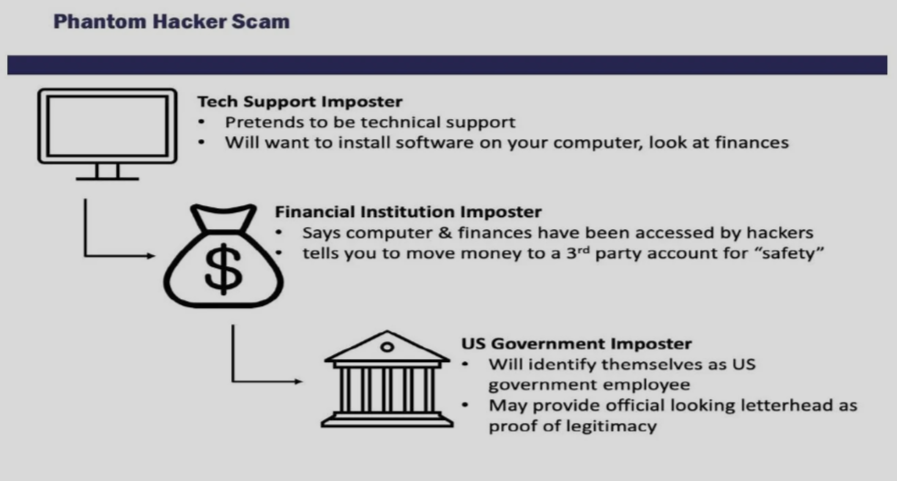Be aware of the Phantom Hacker Scam lurking online!

This article highlights how the scam operates and how to protect yourself, and potentially others.
How Phantom Hacker Scam Operates
Phantom Hacker As Financial Institution Impostor
First of, the scammer poses as a member of a financial institution’s fraud department — a bank or a brokerage firm, and contact the victim.
“The scammer falsely informs the victim their computer and financial accounts have been accessed by a foreign hacker, and the victim must move their money to a ‘safe’ third-party account, such as an account with the Federal Reserve or another U.S. Government agency,” read a portion of the statement.
“The victim is also told not to inform anyone of the real reason they are moving their money,” read a portion of the statement. “The scammer may instruct the victim to send multiple transactions over a span of days or months.”
Phantom Hacker As Government Impostor
In the words of FBI officials, the victim may be contacted by someone posing as the Federal Reserve or another Federal agency.
“If the victim becomes suspicious, the scammer may send an email or a letter on what appears to be official U.S. Government letterhead to legitimize the scam,” read a portion of the statement.
The scammer, according to FBI officials, will emphasize that the victim’s funds are ‘unsafe,’ and that the funds must be moved into a new ‘alias’ account, under the guise of ‘protecting their assets.’
“In reality, there was never any foreign hacker, and the money is now fully controlled by the scammers,” read a portion of the statement.
Phantom Hacker As Tech Support Impostor
The scammer poses as a customer support representative from a legitimate tech company. Then initiate contact with the victim via phone call, text, e-mail, or a pop-up window on the victim’s computer, instructing them to call a number for so-called assistance.
“Once the victim calls the phone number, a scammer directs the victim to download a software program allowing the scammer remote access to the victim’s computer,” read a portion of FBI officials’ statement. “The scammer pretends to run a virus scan on the victim’s computer, and falsely claims the victim’s computer either has been or is at risk of being hacked.
The scammer, according to FBI officials, will then ask the victim to open their financial accounts to determine whether there have been any unauthorized charges. That, officials say, is actually a tactic to allow the scammer to determine which financial account is the most lucrative.
“The scammer informs the victim they will receive a call from that financial institution’s fraud department with further instructions,” read a portion of the statement.
Phantom Hacker Scam – What To Do!
Some tips for people on what to do to protect themselves and avoid being a victim. They include:
- Don’t click on unsolicited pop-ups, links sent via text or e-mail
- Avoid opening unsolicited attachments
- Don’t call the phone number provided in a pop-up, text, or e-mail
- Don’t download software at the request of an unknown person who contacted you
- Avoid allowing an unknown person who contacted you to have control of your computer
Also Read: Allison Strickland Ricketts Facebook Scam, Rives Construction Inc , Usps Lose Parcel , Global Healthcare Resources
